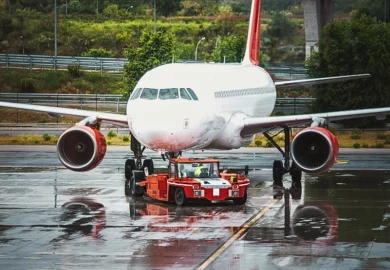A recent incident at O’Hare International Airport has brought attention to the dangers faced by ground crews working near active runways. An airport employee was hospitalized in serious condition after getting hit by a taxiing airplane.
Table of Contents

Airport ground workers routinely operate in fast-paced environments that come with a high risk of injury. According to the U.S. Bureau of Labor Statistics, transportation and material moving occupations account for one of the highest rates of workplace injuries requiring time off. Among these, airport ramp agents and ground crew members are particularly vulnerable due to constant exposure to jet engines, moving aircraft, heavy machinery, and unpredictable weather. Even with proper training and safety protocols, the nature of the job makes serious injuries a real possibility.
If you were injured while working on the ground at O’Hare, Midway, or another airport in the Chicago area, the workers’ compensation attorneys at Ankin Law are here to help. Our team can evaluate your claim, protect your rights, and explore whether additional compensation may be available through a third-party liability claim. Contact our law firm today for a free consultation. 312-600-0000.
Chicago Airport Worker Injured by Taxiing Plane at O’Hare
Recently, a worker at Chicago O’Hare was struck by an aircraft as it was taxiing. The employee, who was performing ground crew duties near a gate, was hit and seriously injured. Emergency crews responded immediately, and the worker was taken to the hospital in serious condition. The airline reported that the flight crew and passengers deplaned safely following the accident. An investigation is underway to determine exactly how the accident occurred.
Why Airport Ground Crews Face Higher Workplace Risks
Ground crew members operate in fast-paced, unpredictable environments that demand constant attention and coordination. These workers are often stationed just feet from moving aircraft, where the risk of being struck by equipment or caught in machinery is a daily concern.
Constant Exposure to Moving Equipment and Aircraft
The job requires close interaction with heavy ground service vehicles, aircraft tugs, fuel trucks, and baggage carts. Any lapse in communication or equipment failure can lead to serious injuries, especially when working in tight quarters with limited visibility.
Weather-Related Hazards on the Tarmac
Rain, snow, and ice can make surfaces slippery and difficult to navigate, increasing the risk of falls. Workers must also contend with poor visibility and fluctuating temperatures that can impact their focus and physical condition. Even routine tasks become more dangerous when combined with harsh environmental factors.
Noise, Fatigue, and Operational Stress
In addition to physical hazards, ground crews face significant auditory stress due to constant exposure to jet engine noise. Prolonged exposure without proper hearing protection can lead to long-term hearing damage. The combination of noise, movement, and time-sensitive operations contributes to a heightened level of occupational stress that can lead to mistakes.
Conflicting Demands Between Speed and Safety
The nature of airport operations means ground crews must complete their work quickly and efficiently, but also safely. Unfortunately, these two demands often conflict. With pressure to maintain on-time departures and handle multiple aircraft within narrow windows, some safety procedures may be rushed or overlooked.
All of these factors combine to make ground crew positions among the most hazardous roles in the transportation industry.
Can Injured Airport Workers in Illinois File for Workers’ Compensation?
Illinois law allows most employees, including those working at airports, to receive workers’ compensation benefits when they are injured on the job. This system is designed to provide financial support for injured workers without requiring them to prove fault. Workers who are hurt while performing their duties typically qualify for benefits that cover their medical care and a portion of their lost wages.
Third-Party Liability in Airport Worker Injury Cases
While workers’ compensation is the primary route for injury benefits, some cases involve the fault of a third party. When someone other than the employer causes the injury, a separate legal claim may be available, which can provide additional compensation for pain and suffering or future lost wages that aren’t fully covered by workers’ comp.
Can You Sue an Airline After a Ground Crew Accident?
Under Illinois law, direct lawsuits against employers are generally barred when workers’ compensation coverage applies. However, if an airline other than the worker’s employer was responsible, or if a separate entity such as an airport contractor was negligent, the injured person may be able to pursue legal action against that party.
In the case of the recent incident at O’Hare, a thorough investigation will be necessary to determine liability. The injured worker was employed by United Airlines, while the aircraft that struck him was operated by American Airlines. Since the aircraft belonged to a separate airline, this may open the door to a third-party negligence claim. If it is found that American Airlines or its personnel acted negligently, such as by failing to follow proper safety protocols or failing to maintain adequate communication with ground crews, the injured airline worker could pursue a lawsuit against the airline.
Get Help If You Were Injured Working at O’Hare or Midway
Given the complexity of airport operations and the number of parties involved, legal representation is often crucial for injured workers. An experienced workers’ compensation lawyer can help ensure that claims are filed correctly and on time, medical evidence is properly documented, and benefits are not unjustly delayed or denied. In situations involving third-party liability, legal help becomes even more important, as multiple claims may need to be coordinated and pursued simultaneously.
The risks of airport groundwork are real, and when something goes wrong, the injuries can be life-changing. Fortunately, Illinois workers’ compensation law provides protections, but only if injured employees take action to secure those rights.
If you or a loved one was injured while working at O’Hare, Midway, or another job site in Chicago, the workers’ compensation attorneys at Ankin Law can help you understand your rights and explore all available legal options. Call our Chicago office at 312-600-0000 to schedule a free consultation.



